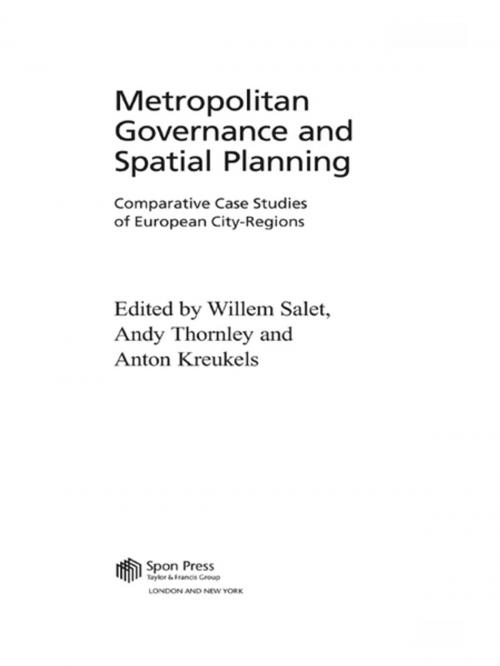Metropolitan Governance and Spatial Planning
Comparative Case Studies of European City-Regions
Nonfiction, Art & Architecture, Architecture, Landscape, Planning| Author: | ISBN: | 9781134496051 | |
| Publisher: | Taylor and Francis | Publication: | August 19, 2005 |
| Imprint: | Routledge | Language: | English |
| Author: | |
| ISBN: | 9781134496051 |
| Publisher: | Taylor and Francis |
| Publication: | August 19, 2005 |
| Imprint: | Routledge |
| Language: | English |
Metropolitan Governance and Spatial Planning explores the relationship between metropolitan decision-making and strategies to co-ordinate spatial policy. This relationship is examined across 20 cities of Europe and the similarities and differences analysed.
Cities are having to formulate their urban policies in a very complex and turbulent environment. They are faced with numerous new pressures and problems and these often create contradictory conditions. The book provides a theoretical framework for exploring these issues and links this to a detailed investigation of each city.
In the context of globalisation, cities in the last twenty years have experienced new patterns of activity and these usually transcend political boundaries. The management of these changes therefore requires an effort of co-ordination and different cities have found different approaches.
However the institutional setting itself has not remained static. The nation states in Europe have handed over many responsibilities to the European Union while also increasing devolution to regions and cities. Government has therefore become a more complex multi-level activity.
There has also been the move from government to governance. Many different public, quasi-public and private bodies are now involved in making decisions that affect urban development. Metropolitan governance is therefore also a complex multi-actor process.
In these conditions of fragmented governance and the widening spatial networking of urban development, the issue of policy co-ordination become ever more important. The exploration of the 20 cities shows that many face similar difficulties while some also provide interesting examples of innovative practice. The book concludes that the way forward is to find strategies to link the different spheres of metropolitan action through 'organising connectivity'.
Metropolitan Governance and Spatial Planning explores the relationship between metropolitan decision-making and strategies to co-ordinate spatial policy. This relationship is examined across 20 cities of Europe and the similarities and differences analysed.
Cities are having to formulate their urban policies in a very complex and turbulent environment. They are faced with numerous new pressures and problems and these often create contradictory conditions. The book provides a theoretical framework for exploring these issues and links this to a detailed investigation of each city.
In the context of globalisation, cities in the last twenty years have experienced new patterns of activity and these usually transcend political boundaries. The management of these changes therefore requires an effort of co-ordination and different cities have found different approaches.
However the institutional setting itself has not remained static. The nation states in Europe have handed over many responsibilities to the European Union while also increasing devolution to regions and cities. Government has therefore become a more complex multi-level activity.
There has also been the move from government to governance. Many different public, quasi-public and private bodies are now involved in making decisions that affect urban development. Metropolitan governance is therefore also a complex multi-actor process.
In these conditions of fragmented governance and the widening spatial networking of urban development, the issue of policy co-ordination become ever more important. The exploration of the 20 cities shows that many face similar difficulties while some also provide interesting examples of innovative practice. The book concludes that the way forward is to find strategies to link the different spheres of metropolitan action through 'organising connectivity'.















